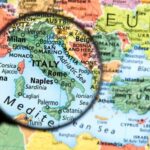Are there any travel restrictions in Italy? As the world continues to grapple with the effects of the COVID-19 pandemic, travelers are met with a complex web of regulations and guidelines when it comes to international travel. In this article, we will delve into the current travel situation in Italy, focusing on the restrictions, policies, and changes that have been implemented in response to the health crisis.
Italy, known for its rich history, culture, and picturesque landscapes, has not been immune to the challenges posed by the pandemic. The country has had to adapt swiftly to ensure the safety of both its residents and visitors. Understanding the latest updates regarding travel restrictions in Italy is crucial for anyone planning a trip to this beloved destination.
From quarantine protocols to testing requirements, travelers must be aware of the evolving policies that may impact their travel plans. This article will provide an overview of the COVID-19 restrictions in Italy, shedding light on the necessary considerations and preparations that prospective visitors need to make before embarking on their journey. Stay informed as we navigate through the complexities of traveling during these uncertain times.
Overview of COVID-19 Restrictions in Italy
Italy has implemented various COVID-19 restrictions to curb the spread of the virus and protect public health. As of now, there are certain travel restrictions in place for individuals entering Italy. Travelers from all countries are allowed to enter Italy for essential reasons such as work, health reasons, or study. However, tourists from some countries may face additional requirements such as quarantine measures upon arrival.
One of the key restrictions currently in place is the need for travelers to fill out a self-declaration form before arriving in Italy. This form includes information about the purpose of travel and contact details, allowing authorities to track individuals if necessary. Additionally, individuals entering Italy may be required to present a negative COVID-19 test result taken within a specific timeframe before their departure.
It is important for travelers to stay updated on the latest travel restrictions and requirements when planning a trip to Italy. These regulations can change frequently based on the evolving situation of the pandemic. By staying informed and following guidelines set by Italian authorities, visitors can ensure a smooth and safe travel experience while complying with necessary protocols.
| Travel Restrictions | Details |
|---|---|
| Self-declaration form | Required for all travelers entering Italy |
| COVID-19 test | Negative test result may be required before arrival |
Changes in Travel Policies and Regulations in Response to the Pandemic
Travel policies and regulations in Italy have undergone significant changes in response to the COVID-19 pandemic. As the situation continues to evolve, it is essential for travelers to stay informed about the latest updates and guidelines before planning their trip. Here is an overview of some key changes that have been implemented to ensure the safety of both residents and visitors:
- Mandatory testing requirements: Travelers from certain countries are required to provide a negative COVID-19 test result upon arrival in Italy. The type of test accepted may vary, so it is important to check the specific requirements based on your country of origin.
- Quarantine protocols: Depending on your vaccination status and recent travel history, you may be subject to quarantine upon arrival in Italy. The duration of quarantine can also vary, so make sure to familiarize yourself with the latest regulations before your trip.
- Health declaration forms: Travelers are often required to fill out health declaration forms prior to their arrival in Italy. These forms typically ask about any symptoms you may be experiencing and your recent travel history, helping authorities assess potential risks.
These changes are crucial in minimizing the spread of COVID-19 and protecting public health. While they may add an extra layer of complexity to travel planning, adhering to these regulations is essential for ensuring a safe and enjoyable experience in Italy. It is recommended that travelers regularly check official sources for updates on travel restrictions and guidelines before embarking on their journey.
Stay tuned for further information on how these changes might impact tourism in Italy and what steps travelers can take to navigate through these evolving travel policies effectively during this challenging time. Remember that staying informed and prepared will help you make the most out of your trip while prioritizing safety for yourself and others around you.
Important Considerations for Travelers Planning a Trip to Italy
Italy has long been a popular destination for travelers seeking art, culture, history, and cuisine. However, the ongoing COVID-19 pandemic has brought about significant changes in travel policies and regulations in the country. For those considering a trip to Italy, it is crucial to be aware of the important considerations to ensure a smooth and safe travel experience.
Current COVID-19 Restrictions
As of now, Italy continues to implement various COVID-19 restrictions to curb the spread of the virus. These restrictions may include mask mandates, social distancing measures, and limitations on gatherings. It is essential for travelers to stay informed about these regulations as they may vary depending on the region within Italy.
Vaccination and Testing Requirements
Travelers planning a trip to Italy should also be aware of vaccination and testing requirements imposed by the Italian government. In some cases, proof of vaccination or a negative COVID-19 test result may be necessary for entry into certain establishments or regions. It is recommended that travelers check the official guidelines before embarking on their journey.
Health and Safety Guidelines
In addition to vaccination and testing requirements, travelers should familiarize themselves with health and safety guidelines provided by local authorities in Italy. This may include information on hygiene practices, proper mask usage, and what to do in case of symptoms. By adhering to these guidelines, travelers can help protect themselves and others during their visit to Italy.
Overall, while there are travel restrictions in Italy due to the pandemic, careful planning and staying informed can help ensure a successful trip for travelers. By following health guidelines, being prepared with necessary documentation, and staying updated on current regulations, individuals can navigate their travel plans with confidence amidst the evolving situation in Italy.
Updates on Quarantine Protocols and Testing Requirements for Visitors
Italy has been implementing strict quarantine protocols and testing requirements for visitors entering the country in response to the COVID-19 pandemic. Travelers arriving from certain countries deemed high-risk may be subject to quarantine upon arrival, depending on the latest regulations in place. It is crucial for travelers to stay informed about these guidelines to ensure a smooth and hassle-free trip.
Quarantine Protocols
Travelers coming from countries with high infection rates are typically required to undergo a period of quarantine upon arrival in Italy. The duration of the quarantine may vary depending on the specific regulations at the time of travel. It is important for visitors to plan ahead and make necessary arrangements to comply with these measures.
Testing Requirements
In addition to quarantine protocols, visitors may also be required to present negative COVID-19 test results before entering Italy. The type of test accepted, as well as the timeframe within which it must be taken before travel, can differ based on the latest guidelines. Travelers should ensure they have all necessary documentation and follow testing requirements to avoid any issues upon arrival.
Stay Informed
Given the rapidly changing nature of travel restrictions in Italy, it is crucial for travelers to stay informed about updates from official sources such as the Italian government or local health authorities. By staying updated on quarantine protocols and testing requirements, visitors can better prepare for their trip and minimize any potential disruptions during their stay in Italy.
Impact of Travel Restrictions on Tourism and Local Businesses in Italy
Italy, renowned for its rich history, vibrant culture, and delicious cuisine, has always been a top destination for travelers around the world. However, with the onset of the COVID-19 pandemic, travel to Italy has been significantly impacted by various restrictions and regulations. The question on everyone’s mind now is: are there any travel restrictions in Italy? The answer is yes, as the country has implemented measures to curb the spread of the virus and protect public health.
Travel restrictions in Italy include requirements such as quarantine upon arrival, COVID-19 testing before departure and/or upon arrival, as well as limitations on movements within the country. These measures have had a profound impact on tourism in Italy, with many visitors either postponing or cancelling their trips altogether. Local businesses that rely heavily on tourism have also suffered due to reduced foot traffic and limited international visitors.
According to recent data from the World Travel & Tourism Council (WTTC), the travel and tourism sector in Italy experienced a sharp decline in revenue due to the pandemic-related travel restrictions. In 2020, the sector’s contribution to Italy’s GDP decreased by over 60%, highlighting the significant economic implications of these measures. As a result, many businesses that cater to tourists, such as hotels, restaurants, and tour operators, have struggled to stay afloat amidst the challenging circumstances.
| Travel Restrictions Impact | Data |
|---|---|
| Decrease in revenue for tourism sector | Over 60% |
| Challenges faced by local businesses | Struggling to stay afloat |
Tips and Recommendations for Navigating Travel Restrictions in Italy
Italy, like many countries around the world, has implemented travel restrictions in response to the COVID-19 pandemic. These restrictions have been put in place to help prevent the spread of the virus and protect both residents and visitors. It is important for travelers to stay informed about these restrictions before planning a trip to Italy to ensure a smooth and hassle-free travel experience.
Here are some tips and recommendations for navigating travel restrictions in Italy:
- Check for updates regularly: Travel restrictions and guidelines can change frequently, so it is crucial to stay up-to-date with the latest information from official sources such as the Italian government’s website or the Ministry of Health.
- Follow health and safety protocols: While traveling in Italy, it is essential to adhere to all health and safety guidelines, including wearing masks in public places, practicing social distancing, and washing hands frequently.
- Plan ahead: Before traveling to Italy, make sure to have all necessary documentation, such as proof of vaccination or negative test results, as required by Italian authorities. It is also advisable to make reservations for accommodations, restaurants, and attractions in advance.
As of now, there are travel restrictions in Italy that travelers need to be aware of. These may include quarantine requirements upon arrival depending on your country of origin, mandatory testing before departure or upon arrival, and limitations on non-essential movements within certain regions. By following these tips and recommendations, travelers can navigate these restrictions smoothly and enjoy their trip while respecting the regulations put in place for public health and safety.
It is important to keep in mind that travel restrictions are subject to change based on the evolving situation with COVID-19. Being flexible with travel plans and prepared for any last-minute changes will be key to navigating these uncertain times effectively. Additionally, being respectful towards local communities and businesses in Italy during this challenging period can contribute positively towards supporting tourism recovery efforts in the country.
Future Outlook
As the world continues to grapple with the impacts of the COVID-19 pandemic, many travelers are left wondering about the future of travel restrictions in Italy. With the constantly evolving situation surrounding the virus, it is crucial to stay informed and prepared for any changes that may affect travel plans to this popular destination.
Experts predict that there will likely be fluctuations in travel restrictions in Italy based on the current state of the pandemic both within the country and globally. It is anticipated that authorities will continue to monitor case numbers and adjust regulations accordingly to ensure the safety of residents and visitors alike. Travelers should be prepared for potential changes in entry requirements, quarantine protocols, and testing mandates as the situation evolves.
One key factor that could impact the evolution of travel restrictions in Italy is the development and distribution of vaccines. As vaccination efforts ramp up around the world, there may be a shift in policies to accommodate vaccinated individuals, potentially easing some restrictions for those who have been immunized.
However, it is important to note that these changes are likely to be gradual and subject to ongoing review by health officials. Travelers should stay updated on any developments related to vaccine requirements for entry into Italy.
Conclusion
As travelers continue to navigate the ever-changing landscape of travel restrictions amidst the COVID-19 pandemic, staying informed and prepared is essential when planning a trip to Italy. The country has implemented various measures to curb the spread of the virus, including quarantine protocols, testing requirements, and limitations on entry from certain countries. Despite these challenges, Italy remains a popular destination for tourists seeking its rich history, culture, and cuisine.
It is crucial for travelers to regularly check for updates on any travel restrictions in Italy before embarking on their journey. By staying informed about the latest regulations and guidelines set forth by the Italian government, visitors can ensure a smooth and stress-free travel experience. Additionally, being prepared with necessary documents, such as negative COVID-19 test results or proof of vaccination, will help streamline the entry process into Italy.
While travel restrictions in Italy may pose challenges for both tourists and local businesses within the tourism industry, it is important to remain patient and adaptable during these uncertain times. As the situation continues to evolve, there may be fluctuations in policies that impact travel plans.
By maintaining flexibility and understanding these changes are made with public health in mind, travelers can contribute to the collective effort in combating the spread of COVID-19 while still enjoying all that Italy has to offer.
Frequently Asked Questions
Are There Still Covid Restrictions in Italy?
Italy has been gradually easing Covid restrictions, but some measures are still in place. These include wearing masks indoors, social distancing, and capacity limits in certain venues. Travelers should stay updated on the current regulations during their visit.
What Is Required for a US Citizen to Visit Italy?
For a US citizen to visit Italy, several requirements must be met. This includes having a valid passport, possibly obtaining a visa depending on the duration of the stay, proof of sufficient funds for the trip, travel insurance, and adherence to any Covid-related protocols in place at the time.
Is There a Travel Advisory for Italy?
As of now, there is no specific travel advisory for Italy issued by the US government. However, travelers are always encouraged to check for updates on safety and security conditions in their intended destination before making plans. It is also recommended to register with the STEP program when traveling abroad.

I’m a passionate traveler, writer, and Italophile. My fascination with Italy’s history, art, and culture has led me on countless adventures across the Italian landscape. Through “I Live Italy,” I share my love for this extraordinary country and aims to inspire others to explore its boundless beauty.





